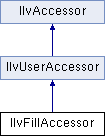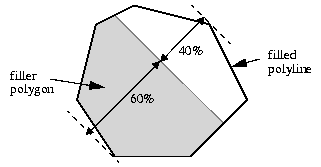
Rogue Wave Views 5.6
Rogue Wave Views
Prototypes Package API Reference Guide
Rogue Wave Views
Documentation Home
 Rogue Wave Views 5.6 |
Rogue Wave Views |
Rogue Wave Views Documentation Home |
Polygon filling behavior. More...
#include <ilviews/protos/fillacc.h>

Public Member Functions | |
| IlvFillAccessor (const char *name, const IlvValueTypeClass *type, const char *nodeName, const char *fillerName, const char *angle) | |
| Creates a fill behavior. More... | |
 Public Member Functions inherited from IlvUserAccessor Public Member Functions inherited from IlvUserAccessor | |
| IlvUserAccessor (const char *name, const IlvValueTypeClass *type, IlUInt flags=0) | |
| Creates a new user accessor of name name and type type. More... | |
| virtual void | initialize (const IlvAccessorHolder *object) |
Attachment method to an IlvAccessorHolder. More... | |
| virtual IlBoolean | isOutputValue (const IlSymbol *name) const |
| Queries if the accessor is an output accessor. More... | |
| IlBoolean | isPrivate () const |
Returns IlTrue if the accessor has the private flag set. Otherwise, it returns IlFalse. | |
| IlBoolean | isRuntime () const |
Returns IlTrue if the accessor has the RunTime flag set. Otherwise, it returns IlFalse. | |
| void | setPrivate (IlBoolean val) |
| Sets the Private flag of this accessor. More... | |
| void | setRuntime (IlBoolean runTime) |
| Sets the RunTime flag of this accessor. More... | |
 Public Member Functions inherited from IlvAccessor Public Member Functions inherited from IlvAccessor | |
| IlvAccessor (const char *name, IlvValueTypeClass *type) | |
| Creates a new accessor of name name and type type. | |
| virtual IlBoolean | changeValues (IlvAccessorHolder *object, const IlvValue *values, IlUShort count) |
Called by the method IlvAccessible::changeValues for each IlvAccessor attached to the IlvAccessorHolder. | |
| virtual void | getAccessors (const IlSymbol *const **accessors, const IlvValueTypeClass *const **types, IlUInt &count) const |
| Returns the names and types of the values handled by this accessor. More... | |
| const IlSymbol * | getName () const |
| Returns the name of the accessor. More... | |
| IlvValueTypeClass * | getType () const |
| Returns the type of the accessor. More... | |
| virtual IlBoolean | isOutputAccessor (IlBoolean &inputAndOutput) |
| Queries if the accessor is an output accessor. More... | |
| virtual IlShort | matchValues (const IlvAccessorHolder *object, const IlvValue *values, IlUShort count, IlvValue *matchingValues=0) const |
| Returns the number of values that are handled by the accessor in the values array of length count. More... | |
| virtual void | queryValues (const IlvAccessorHolder *object, IlvValue *values, IlUShort count) const |
Called by the method IlvAccessible::queryValues for each IlvAccessor attached to the IlvAccessorHolder. | |
| void | setName (const IlSymbol *name) |
| Sets the name of the accessor. More... | |
Protected Member Functions | |
| virtual IlBoolean | changeValue (IlvAccessorHolder *object, const IlvValue &val) |
Called by the method IlvAccessible::changeValue for each IlvAccessor attached to the IlvAccessorHolder. | |
| virtual IlvValue & | queryValue (const IlvAccessorHolder *object, IlvValue &val) const |
Called by the method IlvAccessible::queryValue for each IlvAccessor attached to the IlvAccessorHolder. | |
 Protected Member Functions inherited from IlvUserAccessor Protected Member Functions inherited from IlvUserAccessor | |
| virtual IlUInt | compareValues (const IlvAccessorHolder *object, const IlvAccessible *ref, IlvValue *values, IlUShort count, IlvValueArray &diffs) const |
| Compares the values in ref and object and returns the differing values. More... | |
| IlBoolean | getValue (IlvValue &val, const IlvAccessorHolder *object, IlvDisplay *display, IlvValueTypeClass *typeClass=0, IlSymbol *typeVal=0, const IlvValue *arg=0) const |
| Evaluates a parameter of a user accessor. More... | |
Polygon filling behavior.
Library: ilvproto
IlvFillAccessor is a subtype of IlvUserAccessor used to "fill" a polygon with another one up to a specified level. It can be used to represent filled tanks or pipes with arbitrary shapes.
| IlvFillAccessor::IlvFillAccessor | ( | const char * | name, |
| const IlvValueTypeClass * | type, | ||
| const char * | nodeName, | ||
| const char * | fillerName, | ||
| const char * | angle | ||
| ) |
Creates a fill behavior.
This accessor handles a value of name name that represents a filling ratio. The ratio is a floating-point value between 0.0 and 1.0. When the value is changed, the points of the filler polygon are computed so that it is superposed over the filled polygon (except that it is truncated at the level specified by the fill ratio). The filler polygon can be created initially with any number of points and any geometry: its points will be completely recomputed. The fill ratio defines the height of the filler polygon with respect to the height of the filled polygon, and not its surface. The height is computed in the direction defined by the angle. The example below shows a polyline filled with a polygon at a ratio of 0.6 and an angle of 45 degrees.

| name | Name of the attribute. |
| type | Type of the attribute. It should be a numeric type such as IlvFloatValueType. |
| nodename | Name of a graphic node that must contain an instance of a subclass of IlvPolyPoints (the "filled" polygon). |
| fillerName | Name of a graphic node that must contain another IlvPolyPoints (the "filler" polygon). |
| angle | Specifies the angle (in degrees) at which the polygon is filled, that is, the angle of the segment representing the limit of the filling fluid. If angle is equal to 0, the polygon is filled from bottom to top, and the segment is horizontal. If angle is equal to 90, the polygon is filled from left to right, and the segment is vertical. angle can take any value, not only multiples of 90. The angle parameter can contain a constant value (for example, 90), the name of another accessor (for example, fillAngle), or any arithmetic expression containing accessor names or constants (for example, radians/3.1415*180). |
© Copyright 2012, Rogue Wave Software, Inc. All Rights Reserved.
Rogue Wave is a registered trademark of Rogue Wave Software, Inc. in the United States and other countries. All other trademarks are the property of their respective owners.